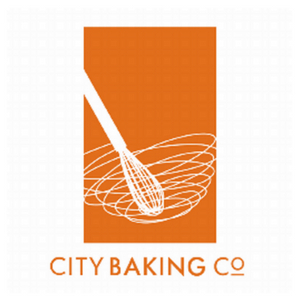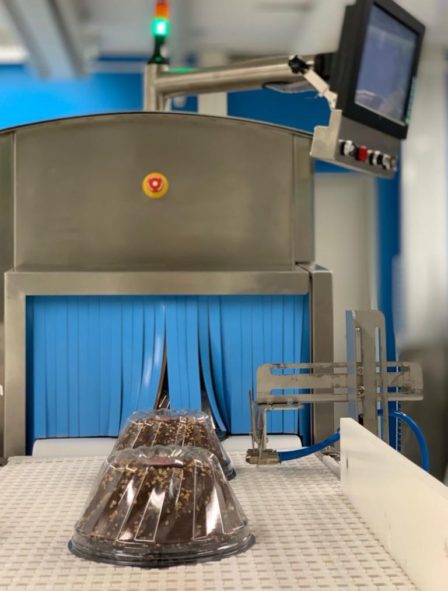
X-ray inspection
Ensures quality
for bustling bakery

When second-generation pastry chef Fernando Lopez and 20-year veteran baker Barry Blaine opened City Baking Corporation in 1995, their shared philosophy was a recipe for near-instant success. Only the finest, freshest ingredients would go into their brownies, cakes, pastries, and cookies. It’s that consistent focus on quality that won the palates of discriminating businesses like Bank of America, Morgan Stanley, Aramark, Compass Group, Sodexo, and a host of hospital and university clients that contribute to the bakery’s $2.3 million annual sales. Blaine and Lopez eschew artificial ingredients — they bake without the aid of preservatives and additives — and for goodness sake, you won’t find any metal or other foreign objects in the confections shipped from City Baking.
For 19 years, City Baking relied on metal detection technology to alert quality control associates to anomalies in the products coming out of its ovens. Jovanna Rey, inside sales coordinator at the bakery, says leveraging metal detection as a quality control helped City Baking stay within the scope of the FDA’s HACCP (Hazard Analysis & Critical Control Points) food safety guidelines. But, as the bakery expanded the size and assortment of goods coming off its production line to meet business demand, its metal detectors proved problematic.
Limitations of metal detection technology for food safety
Rey says City Baking faced two significant challenges with its incumbent metal detection system. “Our metal detector worked well for individual, plastic-wrapped items, but some of our larger and multi-piece catering items and loaf cakes were too big to send through the metal detector,” she says. “We considered purchasing a larger metal detection unit, but that posed another challenge. We use aluminum foil packaging on several of our products. In turn, we determined that the purchase of a larger metal detection unit would not fully solve our problem.” For obvious reasons, metal detection technology isn’t effective on foil packaged goods, and removing those items from their packaging for metal detection inspection wasn’t a viable option for the busy bakery. Not only would forcing that additional step create process inefficiency, but it would also invite even more quality control and product presentation challenges.
Allowing large and foil-wrapped items to pass through the quality control process unchecked posed a grave risk to the business. At City Baking, baked goods such as brownies and loaf cakes are mechanically cut into bars after they come out of the oven on aluminum trays. “There’s always a risk that the cutting machine will shave off a fragment of aluminum before those products are packaged,” says Rey. If that were to happen, and metal-contaminated goods were to make their way to a catering tray that bypassed the metal detection control point, Blaine says the consequences could be dire. “Customers like Aramark, Compass, and Sodexo equate to a significant percentage of our sales,” he says. “If one of them were to find an aluminum shaving in our products, the risk of losing their business would be very serious to ours.”


X-ray food quality inspection mitigates major risk
Just weeks before City Baking was subject to its 2015 HACCP inspection, the bakery’s plight was shared with food safety solutions provider Mekitec by way of a conversation with representatives at Food Online. Mekitec reached out to City Baking to offer a demonstration of its MIDMEKI X-ray inspection system within a week. By March 5, the day of its HACCP inspection, City Baking had purchased and installed a MIDMEKI unit, and its associates were comfortably and confidently using it to ensure all goods leaving the bakery were subject to this critical control point.
MIDMEKI from Mekitec facilitated all of City Baking’s criteria; its large detection area accommodates the baker’s entire product line, ensuring none of its market-ready goods leave the company’s Long Island facility uninspected. MIDMEKI system can effectively operate at conveyor speeds near 2 meters (6.5 feet) per second, ensuring the company can maintain a rapid rate of fulfillment during peak order periods. The compact X-ray unit fits seamlessly at a strategic point in the City Baking production line, where it can monitor baked goods that have already been baked, prepared and packaged for consumers. Because X-ray technology enables in-foil scanning, no manual intervention is necessary to prepare goods for inspection. And, while City Baking production facilities are free of glass, ceramic, stone, and other dense materials, MIDMEKI is capable of detecting those contaminants on the off chance they’re present. That’s an insurance policy that metal detection technology cannot offer.
Ease of use contributes to efficiency
City Baking associates were trained on the MIDMEKI software interface three days prior to its go-live at the bakery. “We were trained by a Mekitec professional, who showed us how to adjust the system to accommodate the different densities of our finished goods,” says Rey. “Mekitec was very responsive to our follow-up questions and very supportive of our aggressive installation parameters.”
Rey explains that if an anomaly occurs, MIDMEKI gives the quality control associate both audible and visual cues to intervene. While City Baking hasn’t yet experienced any such occurrences, the MIDMEKI unit enables far more efficient execution of the company’s protocol for dealing with foreign matter contamination issues in the event they occur. With its previous metal detection solution, quality control associates had no idea where to examine products that had ‘alarmed’ for metal contamination. In contrast, the MIDMEKI interface features an on-screen display of the suspect item, a visual that includes pinpoint direction on the exact location of the contaminant in the product. “If we find a contaminant in an item, we dispose of it,” explains Rey, “but we keep detailed corrective logs, and the additional information we glean from our MIDMEKI machine will help us take corrective action more quickly.”
To ensure the continuous performance of its MIDMEKI installation, quality control specialists at the bakery test the machine daily using Mekitec-provided test cards containing steel and ferrous materials. The results of those tests are also logged daily, an important process that ensures the quality that City Baking customers expect, and one that’s requisite to the HACCP inspection process. “The X-ray system is very easy to use, and it gave us more features and benefits at a better price point than metal detection technology,” Rey concludes.
